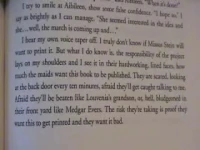The struggle for civil rights started long before the institution of segregation.
From the first time chains were placed upon an individual because of their race, chains that shackled not only their bodies but in some cases their very minds, a battle was waged.
Many of the ideas and images about African Americans from segregation still remain, like theories and actual studies (for example, the 1994 best selling novel The Bell Curve, Intelligence and Class Structure in American Life, by the late Harvard psychologist Richard J. Herrnstein and American Enterprise Institute political scientist Charles Murray), that distort data and pass down concepts from generation to generation, claiming not just the inferiority of one race, but the superiority of another. So it’s important to speak out, because others may not be aware, or if they are, blithely dismiss the inaccuracies. That is what happened in the case of The Help.
The novel was published in 2009, and while this is 2010, protagonists with characteristics mirroring the 1852 novel Uncle Toms Cabin permeate the story. It’s also a major factor why this site was created.
It’s important that all those who state they were children when segregation occurred, but know in their hearts that they shared a bond not just of affection, but of seeing their domestic help as equals, regardless of color speak out.
It’s also crucial that readers be heard, readers who are disturbed by the depiction of characters, whether black or white, which don’t mesh with the message the novel implies, that we’re all the same regardless of color while at the same time over-exaggerating the differences, thereby negating it.
Far too many have become complacent, so that the horrors and unjust treatment during segregation have lost impact.
It’s also important that a counterposition be available when this novel is used in classrooms by instructors enthused about the imagery and stereotypical African American vernacular, and who remain convinced the book is a true “classic” that should be revered.
Whether readers agree or disagree with the novel, love or hate the characters and its themes, please let your voice be heard so that a civil discourse and exchange of opinions can begin.




Jannifer McAdoo
July 27, 2011
I thought I was living in a parallel universe because all my friends seemed to think that I had a problem because I did not like The Help. I reactivated my blog just to vent my feelings (http://janpens.wordpress.com).
Of course, now I wonder if we are giving Stockett too much free press..
acriticalreviewofthehelp
July 27, 2011
Hi Jannifer,
Thanks for your post.
Compared to what we’re up against (PR machine drowning out criticism by pretending its only the dialect that’s the issue) I think every voice speaking out against this novel is needed. At least speaking out so that others who believe all African Americans are in love with the novel realize that’s just not so.
There are white and black readers who recognize the book contains an ugliness throughout, in its view of the black culture which mixes in segregationist ideology as amusing anecdotes coming from the mouths of the black characters.
This post reveals Stockett’s own editors had no clue about Jim Crow, so how in the world would they catch her omnipresent narrator jumping in to make sociological assessments about the black community she had no basis making? (“Plenty of black males leave their families like trash in dump. . .” stated by Minny is one example)
Keep trying to educate your friends. Once their eyes are opened, they may feel quite upset at how they’ve been duped.